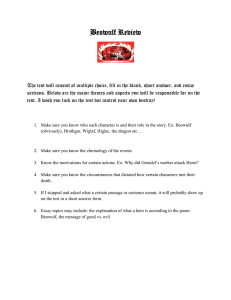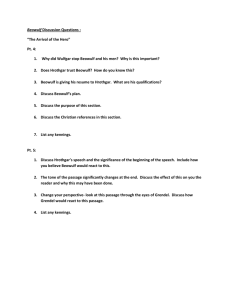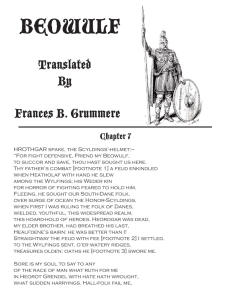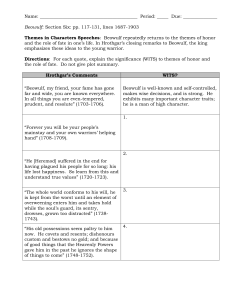Beowulf
advertisement
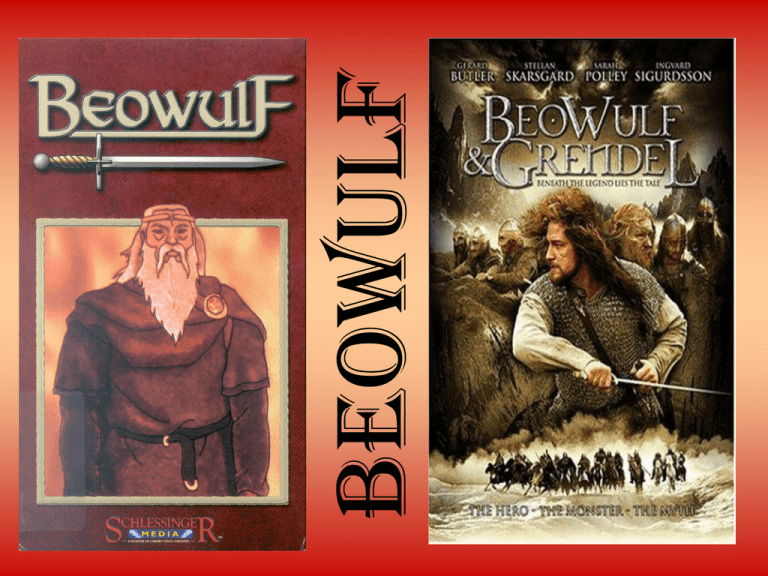
Beowulf The poem begins by contrasting two settings: The dark, desolate lair of the monster Grendel and the noisy, joyous hall at Herot, home of the Danish King Hrothgar and his warriors. … A powerful monster, living down In the darkness, growled in pain, impatient As day after day the music rang Loud in that hall, the harp’s rejoicing … So Hrothgar’s men lived happy in his hall Till the monster stirred, that demon, that fiend Grendel, who haunted the moors, the wild Marshes, and made his home in a hell Not hell but earth… (lines 1-19) The characters are also contrasted; Hrothgar and his men are convivial and loyal while Grendel is exiled and murderous. The conflict between good and evil begins when Grendel attacks Herot at night, killing about thirty of Hrothgar’s men. Grendel violates the Angelo-Saxons’ code of wergild because he pays no reparation for the deaths he causes. In Beowulf the poet sings, How the monster relished his savage war On the Danes, keeping the bloody feud Alive, seeking no peace offering No truce, accepting no settlement, no price In gold or land, and paying the living For one crime only with another. No one Waited for reparation from his plundering claws...(lines 67-73) • • • • • According the Angelo-Saxon’s code of wergild, someone who killed someone had to pay a price for his deed or accept the fact that the victim's relatives would seek revenge. Grendel continues his nightly raids on Herot for 12 years because he knows that the Danes are helpless. He does not touch King Hrothgar’s throne because it is protected by God. Grendel continues his evil deeds until one day Beowulf hears about it and decides to heed the call. Beowulf’s heroic qualities are portrayed in him being greater than anyone else in the world; he acts quickly to rescue the helpless. • • • • Beowulf, the hero of the epic, arrives to aid Hrothgar after Herot has suffered many years. Wulfgar, one of the king’s federal lords greets Beowulf and glorifies him by telling him about the king’s knowledge of Beowulf’s noble birth and his perilous journey to save the king. Beowulf is characterized not only strong and brave but also as wise, just, and noble. Beowulf says that he has come to kill Grendel and he offers proof that he is up to the task. •He says he has killed many enemies, chained five giants and chased their race from earth, and hunted monsters out of the ocean. •Since Grendel uses no weapons, Beowulf asks to face the monster alone in hand-to-hand combat. Like a true hero, Beowulf does not wish to have an unfair advantage. •If the two engage in hand-to-hand combat, good is pitted against evil on a more elemental level. •Beowulf shows no fear because of the Angelo-Saxon’s concept of fate or wyrd. He comments, “Fate will unwind as it must!” (184-189). •In section 5, Hrothgar explains one of his heroic deeds of restoring peace between Beowulf’s father and his relative Edgetho. •Beowulf’s offer to help, according to Hrothgar, is one way of honoring his father’s debt to Hrothgar. •Like a true Anglo-Saxon hero Beowulf honors his father by paying his debt to Hrothgar. •The grateful king accepts Beowulf’s offer and hosts a banquet in his honor. •Unfearth, one of Hrothgar’s men, challenges Beowulf by accusing him of boasting (lines 239-245). •In doing so, he complicates the plot. Unfearth is a character if inferior status. •Unfearth serves as a foil to Beowulf. •He is jealous of anyone with greater fame and glory than he has, he is suspicious of a foreigner, and he is spiteful. •His challenge to the hero reveals additional traits of Beowulf such as honesty and self-restraint. •Unfearth claims that Beowulf was defeated in a swimming match in his youth. Beowulf calmly explains why he returned from the match so late. •Beowulf shows assertiveness as well as restraint and courtesy and responds with a tale-within-a-tale. He recalls how he slew nine sea monsters and swam to safety. •Beowulf then proceeded to point out Unfearth’s unpardonable sin of murdering his kinsmen while Beowulf, on the other hand, has earned glory by defending those more helpless than he. •Unfearth has no means of wergild or man payment (compensation to his relatives) because no such way of making amends existed for taking the life of one’s own kin. Hrothgar gives Beowulf command of Herot and promises him treasures (lines 385-391). •In section 8, Grendel heads toward Herot where Beowulf awaits him. •There is a mighty struggle between god and evil. •Beowulf wins and tears off Grendel’s arm and hangs it from the rafters. •Grendel slinks off and sinks into the murky waters of his lair. •All rejoice at Beowulf’s bravery. •Soon, however, Grendel’s mother decides to avenge on her son’s behalf. •She attacks Herot and carries off her son’s claw. •Hrothgar again seeks Beowulf’s help. •Beowulf responds, kills Grendel’s mother and cuts off Grendel’s head to bring back to Hrothgar. •After 50 winters pass, Beowulf, an old man now faces his final battle. •A fire-breathing dragon is threatening his people. •Beowulf is still the dedicated defender of good against evil and even though fate may not be on his side, he cannot give up. •His sword does not kill the dragon and the dragon lays him low with his steaming breath. •A true Anglo-Saxon hero, Beowulf accepts his fate without complaint while all but one of his men run in fear. •Wiglaf alone remembers the duties due to a kinsman and he helps Beowulf to slay the dragon. •Wiglaf brings the dragon’s treasures to the dying king, Beowulf. •Beowulf says that he is willing to give his life so that his people can enjoy the treasure. •Beowulf’s ashes are placed in a tower by the sea. •The geats regard Beowulf as the greatest of heroes, the most noble of men, so they immortalize him by giving him a place in the community’s memory through the Anglo-Saxon bards recounting Beowulf’s heroic deeds. Angelo-Saxon Values Portrayed in Beowulf •Honoring courage over long life •Enjoying feasting, storytelling, and music •Viewing life fatalistically, even within the Christian tradition •Admiring physical strength more than mental acuity •Valuing loyalty to the lord or king above all
